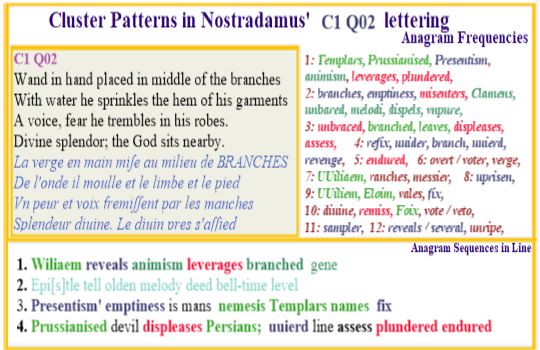 Analyses of all verses
Analyses of all verses
|
 Web Site
Web Site |
 All
Sefirots All
Sefirots |
Nostradamus C1 Q02: Nature of the divine spirit musically evoked in the mind of the prophet
Copyright: Allan Webber, December 2015, June 2023
In this verse Nostradamus' text continues to ouline his memories of the first time his visions of the future materialised. Within the anagrams he describes the mode of thinking that prevailed at the time and whose inhibiting continues today. That mode is presentism which together with the term emptiness occurs in the third line.
The connection between C1 Q01 and C02 Q02 goes beyond their text since the anagram for emptiness in the second verse mirrors the reference to 'a slight flame comes out of the solitude' which is the text of the third line of the first verse.
 In
the current verse the anagrams also show the manner in which
Nostradamus evoked his visions; he chose a setting which helped him dream
and then set up a ritual that would resonate as in music with a person of similar
ability in another age.
In
the current verse the anagrams also show the manner in which
Nostradamus evoked his visions; he chose a setting which helped him dream
and then set up a ritual that would resonate as in music with a person of similar
ability in another age.
They suggest that by tuning his emotions to events and famous figures with whom he was familiar and focussing on the channels he wanted to explore he could follow a theme into the future and if it became too broad he would consolidate it into another limb of the tree of knowledge.
These two verse are also closely linked to the following section of the preface to the first batch of Prophecies published in 1555.
This accords with judicial-astrology [astronomy] where as in the past certain powers and voluntary faculties come to them like flames of fire that appear inspiring that person to judge human and divine inspirations. Because these divine works are to be absolutely complete, God comes to perfect them and while the normal is the work of the angels the third [class delivers] the bad Cesar 1555 Preface (PCE3)
His work is not only consistent in the forementionned instance but in all the significant locations where he expands upon his mechanism as will be seen in my papers at nostradamuscodes.com
In presenting these concepts Nostradamus gives a personal hint of God's role in his experience and that comes as an indirect judgment tool that steers the final outcome of the prophecy.
He relates that both good and bad visions arise within the mind and the right choice by the prophet relies on God but this God doesn't do it himself.
Each of these references presents an image of virtual-beings capable of communicating with his mind and thereby hints at the possible sources of his foreseen knowledge.
But in doing this he is quite aware of his conflict with the commonplace perception of time. In this verse it is raised in the third line where the anagrams for presentism and emptiness appears.
Now Presentism gets to the nub of Nostradamus' enigma and his views on time since it is the present preferred view of the nature of time.
Presentism is commonly used to describe an attitude toward the past dominated by present-day attitudes and experience. It is built on the belief that time can only be known via what is happening now and has already happened. But such a view is tied to the evolution of the human mind and may not be the only possibility. However because it is our experience presentism prevails in the human view of the universe.
The untested part of the human experience is that other beings may have access to more of the time spectrum than us. Similar distinction already persists within the universe for our awareness of the instants of life is not shared by mindless creatures and plants nor is it detectable in rocks, atoms or simple molecules. So even though we don't know of beings that can reach back in time it isn't crazy to suggest that such beings may evolve and have a presence in our time.
And in this current verse such a development can be seen in the anagrams of the line where presentism appears. These present a message 'Man's real emptiness' 'Fix overt Presentism'. Fix, overt, emptiness and presentism are sufficiently uncommon anywhere else in the Prophecies making it difficult to simply dismiss their occurrence in this line as the product of chance.
In addition this cluster fits to what one should expect of the earliest verses namely they present an offset to issues raised by his claim to see the future
That offset can be further seen in the first of six verses where the term eternalism appears. Eternalism sees time as continuous thereby accepting all time has a present reality. The text of that verse (C2 Q36) establishes that it is about this topic as can be seen in reading it.
This verse plays an important part in two of my major papers on this topic called Nostradamus on Future Seeing and Future Seeing Machanics in Cesar Preface.